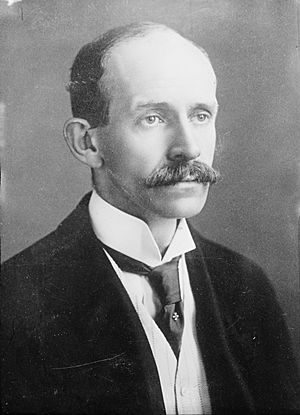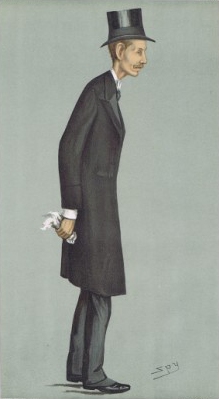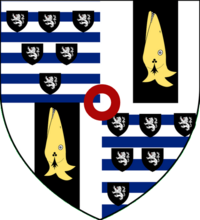Hugh Cecil, 1st Baron Quickswood facts for kids
Quick facts for kids
The Lord Quickswood
|
|
|---|---|

Lord Hugh Cecil, circa 1914
|
|
| Member of the House of Lords Lord Temporal |
|
| In office 25 January 1941 – 10 December 1956 Hereditary peerage |
|
| Preceded by | Peerage created |
| Succeeded by | Peerage extinct |
| Member of Parliament for Oxford University |
|
| In office 15 January 1910 – 23 February 1937 |
|
| Preceded by | John Gilbert Talbot |
| Succeeded by | Arthur Salter |
| Member of Parliament for Greenwich |
|
| In office 13 July 1895 – 8 February 1906 |
|
| Preceded by | Thomas Boord |
| Succeeded by | Richard Jackson |
| Personal details | |
| Born |
Hugh Richard Heathcote Gascoyne-Cecil
14 October 1869 Hertfordshire, England |
| Died | 10 December 1956 (aged 87) Sussex, England |
| Political party | Conservative |
| Relations | Robert Arthur Talbot Gascoyne-Cecil 3rd Marquess of Salisbury (father), Georgina Caroline Alderson (mother) |
| Alma mater | University College, Oxford |
Hugh Richard Heathcote Gascoyne-Cecil, 1st Baron Quickswood (14 October 1869 – 10 December 1956) was a British politician. He was a member of the Conservative Party. Until 1941, people called him Lord Hugh Cecil.
Contents
Early Life and Education
Hugh Cecil was born in 1869 in Hertfordshire, England. He was the youngest of eight children. His father, Robert Gascoyne-Cecil, 3rd Marquess of Salisbury, was a very important person. He served as the Prime Minister of the United Kingdom three times. Hugh's mother was Georgina Alderson.
Hugh had several famous brothers, including James Gascoyne-Cecil, 4th Marquess of Salisbury and Robert Cecil, 1st Viscount Cecil of Chelwood. He was also a cousin of another Prime Minister, Arthur Balfour. Hugh went to school at Eton and then studied at University College, Oxford. He graduated with top honors in History in 1891. After that, he became a fellow at Hertford College, Oxford, where he worked until 1936.
Political Career Highlights
After finishing university in 1891, Hugh Cecil started working in politics. From 1891 to 1892, he was a special assistant to his father, who was then the Foreign Secretary. In 1895, he became a Member of Parliament (MP) for Greenwich. An MP is someone elected to represent a specific area in the House of Commons, which is part of the UK Parliament.
Hugh Cecil was very interested in religious matters. He believed that children should be taught the beliefs of their parents in school. He also thought that the Church of England and other Christian groups should work together. He was known for speaking his mind, even if it meant disagreeing with his own party's leaders.
The Hughligans and Free Trade
In the early 1900s, Hugh Cecil led a group of young Conservative MPs called the "Hughligans." This group included famous politicians like Winston Churchill. They were known for being critical of their party's leadership. Churchill greatly admired Hugh Cecil's speaking skills in Parliament.
Hugh Cecil strongly disagreed with a policy called "tariff reform," which involved putting taxes on imported goods. He believed in "free trade," meaning goods should be traded without such taxes. Because of his strong views on free trade, he lost his seat in Greenwich in the 1906 election.
Representing Oxford University
In 1910, Hugh Cecil was elected as an MP for Oxford University. He held this position for 27 years. He was very active in debates, especially against the government's plans to change the power of the House of Lords. He also strongly opposed the idea of "Home Rule" for Ireland, which would have given Ireland more self-governance.
During the First World War, Hugh Cecil served as a Lieutenant in the Royal Flying Corps, which was an early air force. He was recognized for his contributions to the country and became a member of the Privy Council in 1918. This is a group of important advisors to the King or Queen.
Later Life and Peerage
Hugh Cecil was a dedicated member of the Church of England. He received an honorary law degree from Oxford University in 1924. He also spoke up for people who refused to fight in wars for moral reasons, known as conscientious objectors.
In 1937, he left the House of Commons because he was appointed as the Provost of Eton College. This is a very important leadership role at the famous school. He held this position until 1944. On 25 January 1941, he was given a special title and became Baron Quickswood. This meant he became a member of the House of Lords.
Personal Life
Lord Quickswood never got married. He passed away on 10 December 1956, at the age of 87. Since he had no children, his title of Baron Quickswood ended when he died.
Arms
|
 | May Edward Chinn |
 | Rebecca Cole |
 | Alexa Canady |
 | Dorothy Lavinia Brown |




